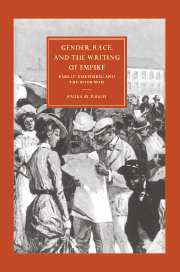Book contents
- Frontmatter
- Contents
- Acknowledgments
- 1 The war at home
- 2 The concentration camps controversy and the press
- 3 Gender ideology as military policy – the camps, continued
- 4 Cannibals or knights – sexual honor in the propaganda of Arthur Conan Doyle and W. T. Stead
- 5 Interpreting South Africa to Britain – Olive Schreiner, Boers, and Africans
- 6 The imperial imaginary – the press, empire, and the literary figure
- Notes
- Works cited
- Index
- CAMBRIDGE STUDIES IN NINETEENTH-CENTURY LITERATURE AND CULTURE
5 - Interpreting South Africa to Britain – Olive Schreiner, Boers, and Africans
Published online by Cambridge University Press: 22 September 2009
- Frontmatter
- Contents
- Acknowledgments
- 1 The war at home
- 2 The concentration camps controversy and the press
- 3 Gender ideology as military policy – the camps, continued
- 4 Cannibals or knights – sexual honor in the propaganda of Arthur Conan Doyle and W. T. Stead
- 5 Interpreting South Africa to Britain – Olive Schreiner, Boers, and Africans
- 6 The imperial imaginary – the press, empire, and the literary figure
- Notes
- Works cited
- Index
- CAMBRIDGE STUDIES IN NINETEENTH-CENTURY LITERATURE AND CULTURE
Summary
Just as British imperial policy depended on colonial as well as domestic factors, so did public discourse on imperialism. This chapter examines the writings of a South African literary figure, perhaps the South African most well-known in Britain during the Boer War, apart from Boer president Paul Kruger. Olive Schreiner's nonfiction about South Africa, addressed to British audiences, was a different kind of journalism from the press coverage of the Boer War, a different kind of propaganda from the kind practiced by Doyle and Stead. Schreiner's efforts in periodicals and pamphlets are the most important pro-Boer writings by a literary figure in a public debate that was notable for the presence of literary figures. Schreiner's pro-Boer writings were published before the war and were aimed at promoting British fellow-feeling toward the Boers. The Boers would, Schreiner argued, be mixing with Britons to produce the future, blended white race of the united British colony of South Africa.
British relations with South Africa were affected by questions of race, but it is important to note that the questions of race that were of most immediate concern to the British in the years just before as well as during the war were questions of the compatibility of the two white “races” in South Africa. The prosperous South African colony that the British hoped would result from the Boer War was a colony not unlike Australia or Canada – a colony in which the indigenous population was seen as hardly significant.
- Type
- Chapter
- Information
- Gender, Race, and the Writing of EmpirePublic Discourse and the Boer War, pp. 109 - 142Publisher: Cambridge University PressPrint publication year: 1999

